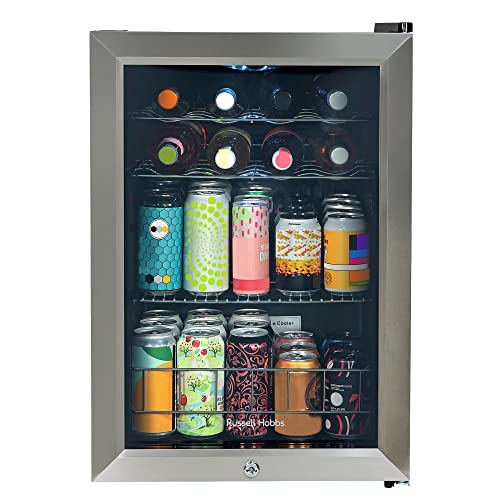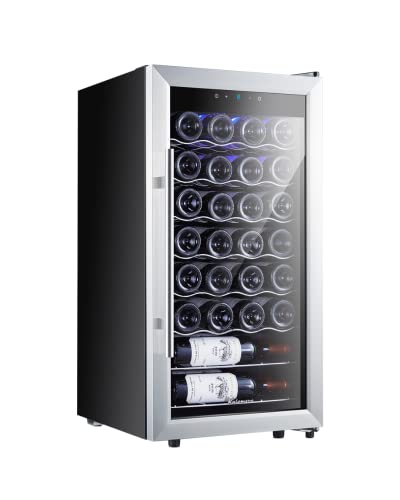You'll Be Unable To Guess Wine Refrigerator Built In's Benefits
페이지 정보
작성자 Reagan 작성일 24-11-08 04:27 조회 16회 댓글 0건본문
 Energy Efficient Wine Storage With a Wine Refrigerator Built in
Energy Efficient Wine Storage With a Wine Refrigerator Built inKeep your wine at the ideal temperatures to serve or for long-term storage by using this energy efficient built in wine refrigerator. You can store white and red wine separately in two temperature zones to preserve their full flavour.
 These units are designed to seamlessly blend into your cabinetry and can be positioned beneath countertops to give you an easy access to refreshing Riesling glass after dinner. But, they need proper ventilation and adequate clearance to let heat escape efficiently.
These units are designed to seamlessly blend into your cabinetry and can be positioned beneath countertops to give you an easy access to refreshing Riesling glass after dinner. But, they need proper ventilation and adequate clearance to let heat escape efficiently.Capacity and size
A wine refrigerator built in provides a sleek and stylish alternative to bulky freestanding units. Built with front vents, these wine coolers can be installed into counters or cabinets to create a seamless design. They also provide more flexible storage options that allows you to switch from wine to cold beverages.
With capacities that can reach 368 bottles The wine refrigerators are designed for serious collectors with large wine fridge collections. These units prioritize storage capacity as well as precise climate control to ensure that your wine is properly protected in the long term. These units are perfect for basements, garages and unconditioned spaces where a more robust and durable storage space is required.
The capacity to cool wine refrigerators is usually measured by the number of standard Bordeaux-style bottles that can be accommodated. It is also important to consider whether your collection of wine includes other sizes of bottles like Champagne or Burgundy. This will impact your capacity requirements as these bottles require more space than the standard Bordeaux bottle. Some wine fridges come with adjustable shelves to accommodate different sizes of bottles.
You'll also have to think about where you want to put it. If you plan to install it inside the cabinetry you already have, you'll require 6 inches clearance in the rear as well as on both the right and left side. This is to ensure that the heat emitted by the wine refrigerator can be able to escape without restriction and avoid overheating.
If you want to splurge on a premium model that has stunning stainless steel finishes you should consider the addition of one of these top-of-the-line wine fridges to your kitchen. With their sleek and elegant doors they are the ultimate in elegance and will make an impressive piece of furniture to your home. These units come with larger capacities, which are ideal for those who like to host large gatherings and parties. These wine refrigerators offer many features like dual-zone cooling UV protection and many other options.
Ventilation
If a wine fridge is not properly ventilated, hot air can collect and cause the appliance to overheat. Ventilation is important because it helps the cooler maintain an optimal humidity and temperature while also ensuring against fluctuations in temperature that could damage the bottles or alter the taste of the wine. Check your wine chiller under counter refrigerator after it has run for a few minutes to ensure that it has the right ventilation system. If the refrigerator is cool to the touch then it is well-ventilated.
Most wine fridges come with an internal temperature sensor that checks the temperature within the cooler and alerts you when it is out of the range. Some models have dual temperature-controlled zones to allow you to store different types of wines at ideal serving temperatures.
The ideal temperature to store wine chiller under counter is between 55 and 66 degrees Fahrenheit. This will help prevent cork decay and other issues that can damage your collection. Certain models come with a light that illuminates when the temperature inside is below the desired temperature.
Based on your storage needs depending on your needs for storage, a built-in wine refrigerator is the ideal option to house your entire collection. They can be installed beneath counters in your kitchen or bar to allow guests to access. Some models come with front ventilation which means they can be installed flush with your cabinetry to create sleek design.
It is crucial to determine the size of the room and take into consideration the cabinet's size prior to installing a wine refrigerator. To allow adequate ventilation, the refrigerator should be placed at a minimum of an inch from any wall. A wine chiller refrigerator that is pushed against a cabinet or wall can block vents, blocking heat from escaping. Freestanding wine refrigerators have a rear or side vents to distribute heat efficiently.
Installation
A wine fridge with built-in storage can be a stylish and useful addition to your bar. But, there are a few things to consider when deciding on the ideal location for your new appliance.
Make sure that your new cooler is equipped with adequate ventilation. If a wine fridge is not properly vented it will get hot and will eventually decrease its lifespan.
You should also keep your wine fridge away from direct sunlight and other heat sources. This will shield your collection from harmful ultraviolet rays from the sun and let it cool quickly.
Lastly, make sure your wine refrigerator is not too close to another heat-producing appliance like a dishwasher. This could cause your wine to become damaged or to have unpredictable temperature fluctuation.
Wine refrigerators come in two varieties: built-in and freestanding. Freestanding wine fridges offer more flexibility in terms of installation, while built-in units are a perfect fit into your kitchen cabinets. Both come in a variety of sizes and styles so you can find the one that is perfect for your home.
To ensure that your new wine fridge is able to properly ventilate, you must determine the area in which you plan to install it. For ventilation, you should leave at least an inch around the unit. Also, make sure that the door is fully open. If it can't then the racks inside will be difficult to access.
Some models may also have specific temperature preferences. For instance, some wine refrigerators are able to keep red wines at an optimum serving temperature of 55 degrees Fahrenheit while others may only be suitable for storage that is long-term. Depending on your needs, you may be interested in purchasing a dual-zone wine refrigerator, which allows you to store wines that have been stored for a long time at the right serving temperature, and serve chilled beverages in the other zone.
If you're planning on installing a wine refrigerator built in, be sure to read the manufacturer's instructions carefully to ensure that the new cooler is properly installed. It is recommended to wait a few hours after bringing it in before turning it on to let the coolant settle.
Energy Efficiency
In the current era of high-cost energy, it's essential to consider the power consumption of any appliance. When buying a built in wine fridge, look for models that have an energy efficiency rating, or Energy Star certification. This indicates that the wine refrigerator is constructed with the most advanced cooling technology and insulation to help conserve energy.
A wine refrigerator must cool the entire interior as well as the bottles kept within. A larger wine fridge with a larger capacity for bottles will use more energy than a small model. Also, the temperature of the room can influence the energy consumption of the fridge as it works harder to keep a cooler interior.
To cut down on the amount of energy consumed by your wine fridge, ensure that it is always stocked. It may seem counterintuitive but a wine refrigerator that is filled with sealed and cold bottles won't need to work as hard to maintain its internal temperature. Maintaining your shelves and bottles in a proper arrangement can help your wine refrigerator work more efficiently. If you place your bottles horizontally, they'll cool more quickly than if you arrange them on their sides.
Another way to help reduce the energy consumption of your wine fridge is by choosing a new model that has the latest cooling technology. The most recent models are generally more efficient than older wine fridges, and can save you as much as PS100 per year in energy costs.
Select a wine fridge with an energy-efficient cooling compressor when shopping. This kind of refrigerator is eco-friendly and consumes less energy than those with a high-energy compressor system. Consider a thermoelectric fridge. These wine coolers cool the inside using the Peltier-effect, which consumes significantly less energy than compressor-powered units. They are more sensitive to temperature and require more maintenance. Choose a brand with an established track record of making reliable and high-quality wine refrigerators. They're likely to make refrigerators with an energy-efficient cooling system and quiet operation.
댓글목록
등록된 댓글이 없습니다.
